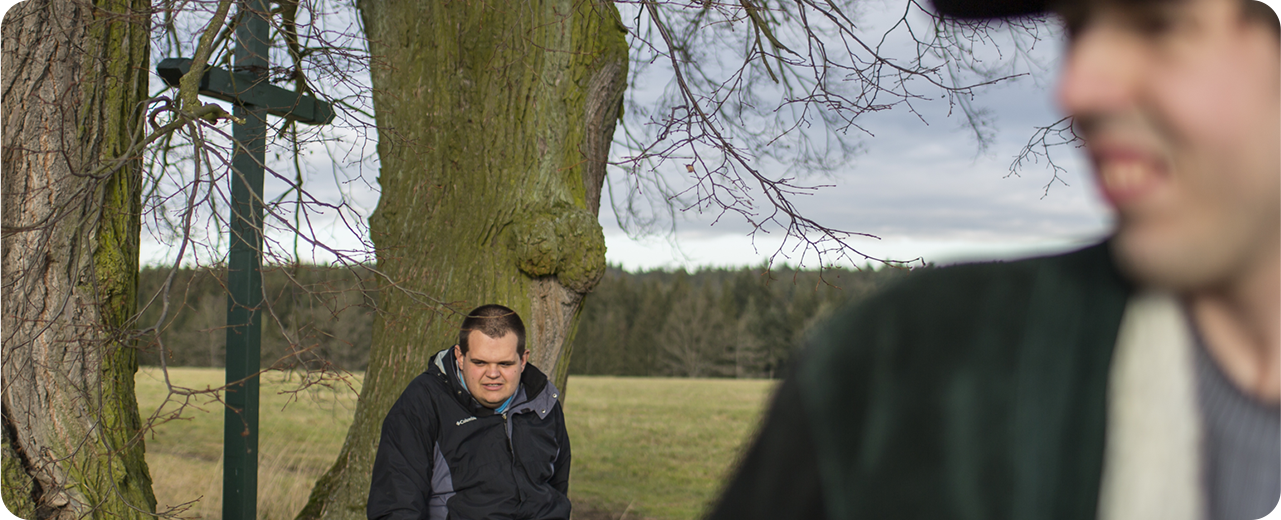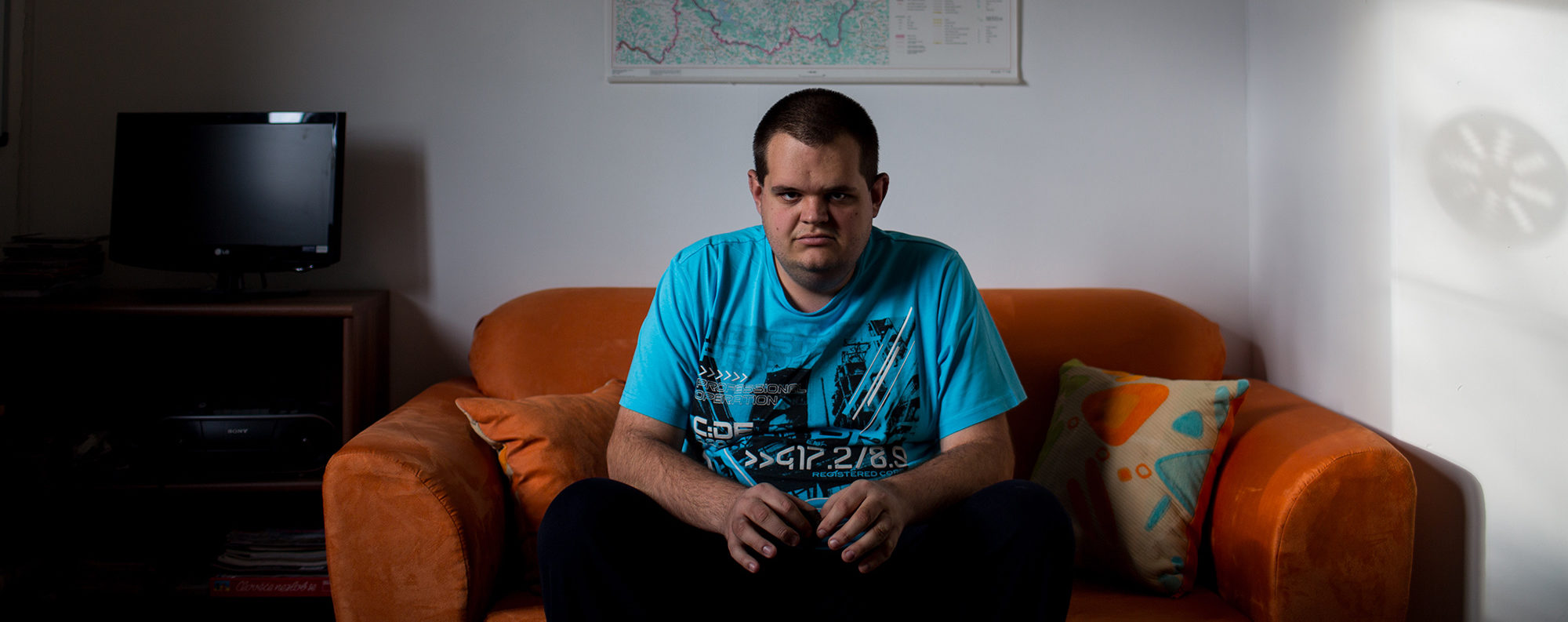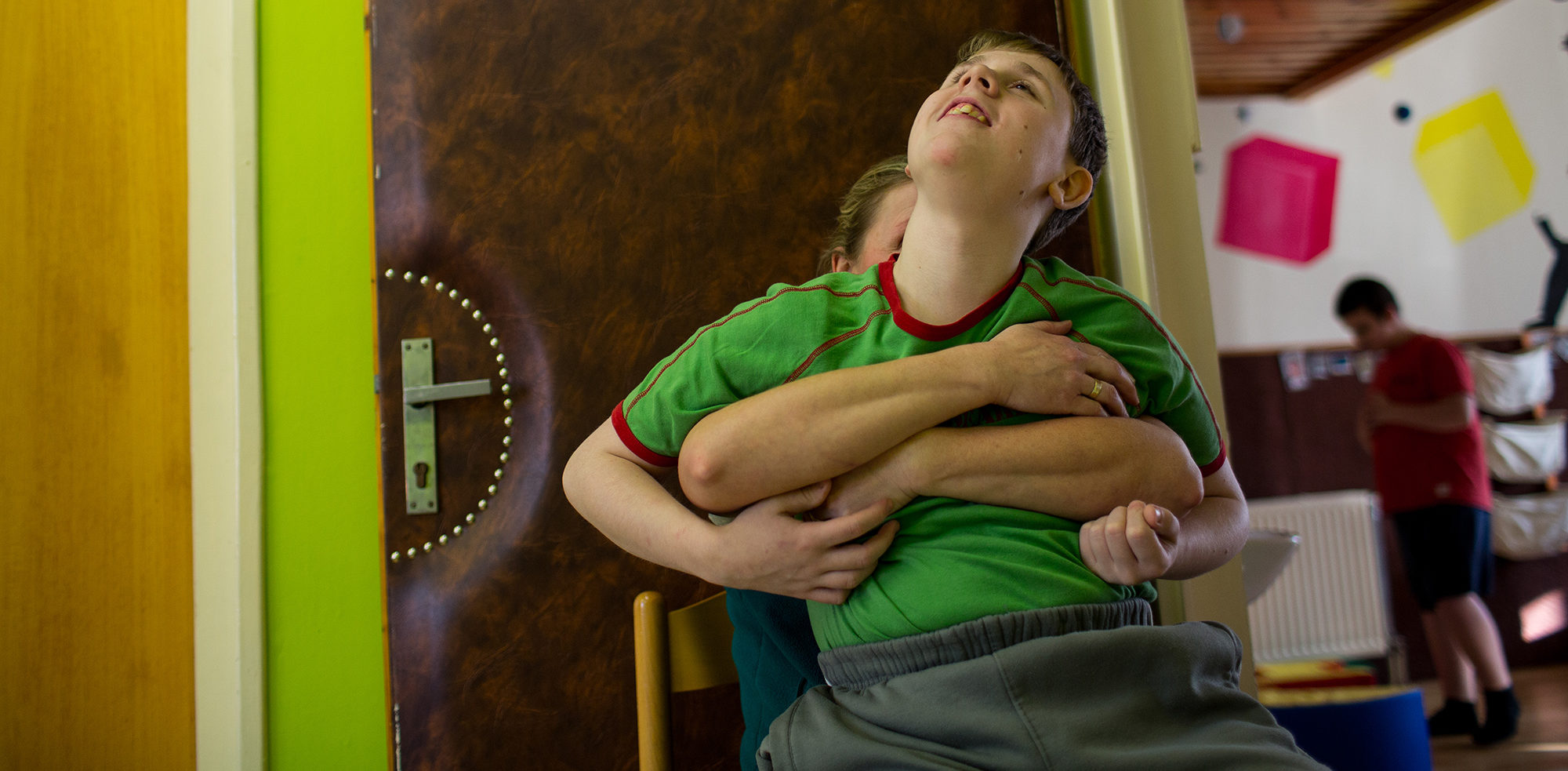Behavior as a challenge
Parents of children with a severe autism are exposed to stress levels similar to those experienced by soldiers in a war. This is not a hyperbole, it’s a reality supported by scientific research. The reason is an unceasing burden in the form of challenging behavior.
It’s like a war
We are not sure how many children in the Czech Republic suffer from autism combined with challenging behavior. If we take demographic studies conducted in other countries as a basis, we can estimate there are roughly four thousand people that have a combination of some kind of mental handicap and challenging behavior. Autism is not the only handicap, but it’s likely to be most prevalent among these.

The English term “challenging behavior” can be understood as behavior that poses a challenge. This challenge may take many forms — insomnia, aggression, screaming, self‐harm, restlessness, hyperactivity, unusual sensitivity to stress, breaking stuff, climbing to high places, or uncoordinated escapes to nowhere. The degree of this behavior can be mitigated with therapy, which is unfortunately largely unavailable in the Czech Republic, and good care, which takes a lot of capacity from the family.
The reality in the Czech Republic is such that the afflicted child often receives little to no assistance. The parents have no time to rest, nor time to take care of normal everyday tasks like shopping, cleaning, or a doctor’s appointment. Often they have no time to spend on things we take for granted, like drinking a cup of coffee or reading the newspaper. Some children require almost constant, very demanding supervision. Others can be aggressive, which can pose real danger, especially in the case of adolescent boys and men.
The amount of stress and exhaustion experienced by families of autistic children is among the highest of any caregivers for people with disabilities. It often causes the family to break up, leaving one person in even more demanding situation of handling this alone. An 2009 study from the University of Wisconsin measured levels of stress hormones in mothers of autistic children a found them to be similar to those of soldiers in a war zone.
A holiday? Dream on…
The following quotations come from a poll conducted among roughly seventy families comprising our organization. We decided to keep them anonymous, but to mention them as an illustration of the challenges such families go though every day.
Under pressure with no respite
“Yes, we live almost in isolation. Our son doesn’t like changes and visitors. Neighbors have been tolerant so far, but I’m not sure how long it will last. My son’s father left us because of his disability.”

“Since that time we tried to protect him from himself, and the people around from his attempts at harming them (walking harness, protective helmet, binding of arms and legs). Over time, we kept retreating and losing. Our son is currently fully tied down to the wheelchair. He has a special mobile toilet, bathes in an inflatable boat, has a padded bed where he is tied down, and special helmet. When we are moving him from wheelchair to the bed, or during bathing, help of two or three people is required, with a precise routine. It’s obvious that any unusual situation, such as diarrhea, medical examination, wheelchair malfunction, or one of the parents not being present is almost an insurmountable problem.”
“We are under constant pressure, with almost no respite.”
“Living with a child with ASD has affected us significantly. Because of problems with neighbors, we had to move to the countryside to our cottage. Our contacts with the wider family are minimal, because of the behavior of our child. Our friends are now mostly people with a similarly afflicted child. Long term care for our son is very stressful, and has taken a heavy toll on our health as parents.”
“Our quality of life is near zero. We have no hobbies and no friends. The only time we can take a break is at night. No time for us as husband and wife. Going to the theater, dinner, a vacation without children … all out of the question.”
“If one of our friends or family members comes to visit me, my son cannot stand him for long, and will start to throw him out of the apartment after ten minutes. If I wanted to go visit someone, that’s also not possible, because he doesn’t want to be there. So I stay here, isolated from the outside world in my apartment. As my son grows older, his aggression gets worse and less manageable, so I even have to call an ambulance.”
“I and my husband had our first vacation in 26 years, when our son was finally in an year‐long residential care service.”
Fear of the future
“The terms and conditions of such institutions usually contains this statement: the service won’t be provided to individuals, whose behavior would threaten peaceful coexistence (including behavioral disorders, aggression, etc.). We live in fear of the future.”
“After 19 years, I couldn’t handle the sleep deficit anymore, so we had to put her for diagnostic hospitalization in a psychiatric ward. The problem was solved in a month. When we put her into their care, she was a mostly happy, walking girl. When we came to pick her up, I found out they turned my daughter into something I had to carry on my back, something that didn’t even recognize me anymore, because of the drugs they were giving her.”
“At the moment, there is only one institution in the Czech Republic that matches our requirements, and the waiting list is so long that I don’t see a chance we could get a spot there in the next 10 years.”
“My everyday problems are his aggressive attacks against me, and fits of rage. The thought that there is no other institution where I could leave him with good conscience is very troubling, almost depressing.”
Why are the services lacking
The logic of social support should be that those who need most help receive the most help. Unfortunately, in the case of children with severe autism, it’s often the opposite.
Demanding clients
The families will need help from social services if they are to handle living with autistic children. Their absence is by no means the only problem they are facing. Other problems are unavailability of therapy, education issues, not enough leisure activities, etc. But the social services are a necessity for leading a normal life.

Their present unavailability has multiple reasons, but the main one is quite simple. Caring for clients with autism and challenging behavior is more demanding, therefore more expensive.
Here is an example: for an assistant that helps the disabled, it is difficult enough to care of a client with lowered mobility, such a paraplegic or a bedridden person. An autistic client is even more demanding, both physically and mentally. Apart from requiring assistance, he can also be aggressive, break things, start running away, harm himself, etc.
He is attached to a certain stereotype, you have to keep an eye on him at all times, deal with fits of restlessness or screaming. Such work is much more difficult. For some clients, only a man with good physical and mental dispositions can handle it, but his usual reward would be 100 CZK (3.80 EUR) per hour, which probably won’t be enough for him.
In the case of respite, and especially residential services, a similar logic applies. For example, homes for people with disabilities are financed in a way that assumes that one social worker is taking care of a certain number of clients — let’s say it’s ten. But a person with autism sometimes requires constant presence of one assistant, and also has specific demands for his environment and for how he spends his time, which spring form the disease. Ordinary social services cannot finance these special needs.
Seeing the real people
The result of this situation is that in most cases, social services reject such clients. Some of them will accept them out of good will, but they lack the capacity to offer care on the level that is required, and coexistence becomes unpleasant for all parties involved. Many people with autism needlessly end up hospitalized in psychiatric wards.
It is true that the state has one unusual category of services — the so called Special regime homes — that are receiving higher grants. But there are only a few of them, they are always full, and their waiting lists are long. As parents, we don’t see this system as ideal. Special regime homes are usually located very far from our real homes, so they don’t allow maintaining contact between children and their families. Also, concentrating only clients with challenging behavior in one place brings coexistence issues, and doesn’t allow for matching clients that can live together.
The first thing that needs to change is the system for funding these services. The funding, that is currently mostly provided by regional authorities the Ministry of Labor and Social Affairs, should be weighted, not flat based on employee count or client count. This process needs to be individualized in the relation to real people, their situation and their needs. The funding has to follow the assessment of real needs of concrete clients that the service should be helping.
We have seen a similar system in the Netherlands, and it works great — to the benefit of the families, social workers, and people with autism as well. We think that for the society, such system can be more beneficial even in economic terms.
